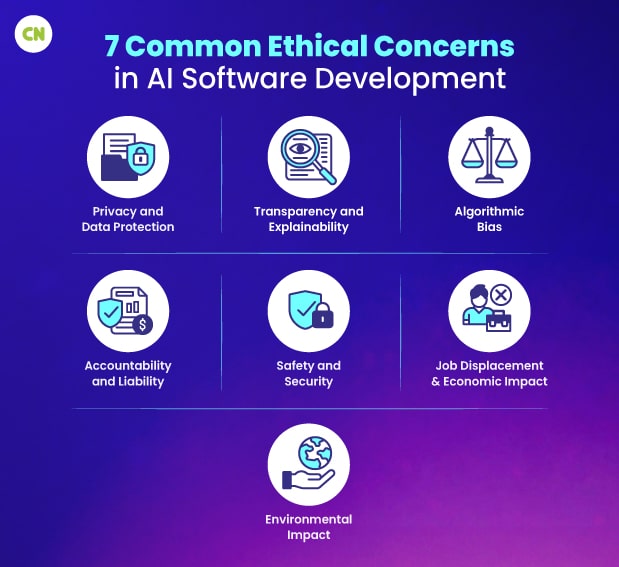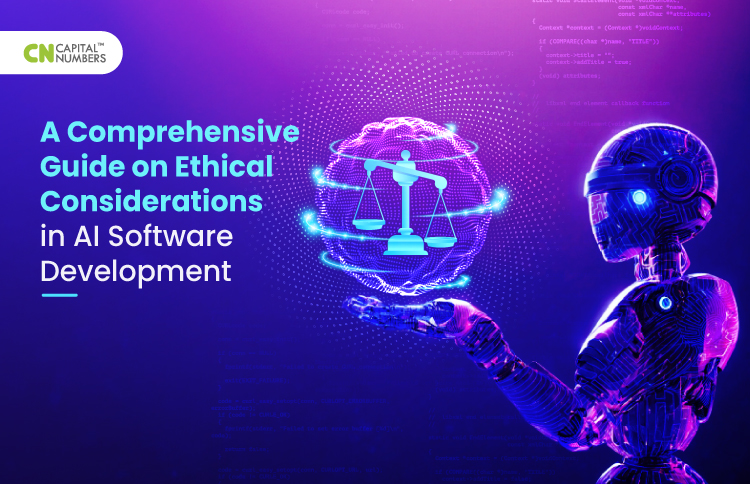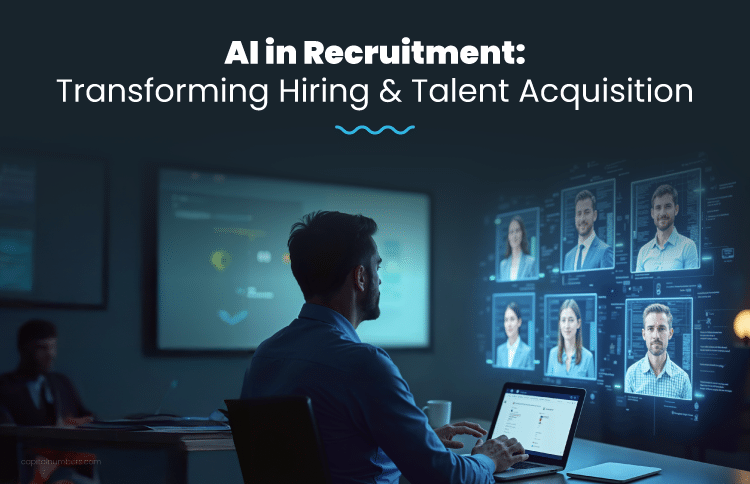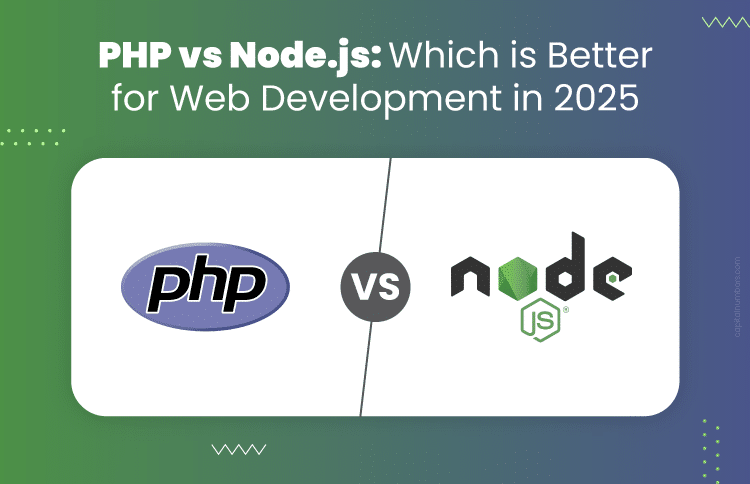A Comprehensive Guide on Ethical Considerations in AI Software Development
Table of Contents
In an era where artificial intelligence (AI) is reshaping society, the discussion around its development goes beyond technical capabilities to focus on the ethical implications. As AI systems such as ChatGPT, Google Bard, Chatbots, and others evolve and impact our lives, the moral dimensions of these technologies come into sharp focus. The question is not just about what AI can do but what it should do, highlighting the need for ethical considerations in AI development.
This necessity brings AI development into a new light, emphasizing their role in creating sophisticated algorithms and ensuring those algorithms operate within ethical boundaries. As AI development services push the boundaries of innovation, integrating ethical considerations is important to prevent potential harms and biases. The development of AI, therefore, is not just a technological venture but a moral one. It aims to ensure that AI advancements benefit society without compromising ethical values. So, if you’re planning for AI development, ethical considerations are not negotiable. Read on to know in detail.
Understanding the Ethical Landscape of AI
Ethical AI refers to the principles and practices that ensure the development, deployment, and use of artificial intelligence technologies contribute to society without causing harm. The significance of ethical AI lies in its potential to guide AI software development in a way that aligns with societal values and human rights. It ensures that these technologies benefit humanity as a whole.
Key Ethical Principles in AI
- Fairness: Developers should build AI systems in such a way that they avoid bias and ensure equitable outcomes for all users, regardless of their race, gender, or background.
- Accountability: Designers and operators of AI systems should take responsibility for the impacts of their technologies, allowing for audits and corrections when needed.
- Transparency: AI processes should be understandable and transparent, allowing users to comprehend how decisions are made and on what basis.
- Privacy: The collection, storage, and processing of data by AI systems should respect individual privacy rights and comply with data protection laws to safeguard personal information against misuse.
Challenges in Ethical AI Implementation
- Data Bias: Identifying and addressing biases in training data, especially when deeply ingrained in societal structures.
- Accountability Complexity: Difficulty in assigning clear responsibility in AI development, especially with multiple stakeholders and autonomous systems.
- Transparency: Making AI algorithms understandable to non-experts due to their complexity and proprietary nature.
- Privacy Protection: Balancing AI-driven data analysis benefits with privacy concerns among growing data collection and surveillance technologies.
Ethical Concerns in AI Software Development

-
Privacy and Data Protection
AI systems often rely on vast amounts of data to train and operate effectively, raising concerns about the privacy and security of individuals’ personal information. Inappropriately collected or shared data can lead to privacy violations, identity theft, and unauthorized surveillance. Also, the potential for re-identifying individuals from anonymized datasets can cause additional risks to privacy, emphasizing the need for robust data protection regulations and practices.
-
Transparency and Explainability
Transparency refers to the ability to understand and explain how AI systems arrive at their decisions. Lack of transparency can lead to mistrust among users, especially when AI systems make critical decisions that impact their lives. Explainable AI techniques aim to provide insights into the inner workings of AI models, enabling users to verify the fairness, accuracy, and ethical considerations of their outcomes.
-
Algorithmic Bias
The accuracy of AI systems relies heavily on their training data. Biases in this data can lead to biased outcomes. For example, if historical data used to train a hiring algorithm exhibits gender bias, the algorithm may discriminate against certain genders in job applications. To create ethical AI, developers must thoroughly examine and address biases in datasets to ensure fair and impartial results for all users, irrespective of race, gender, age, or other protected attributes.
-
Accountability and Liability
Determining accountability for the actions of AI systems is challenging, particularly in cases of errors, accidents, or harmful outcomes. Questions arise regarding whether responsibility lies with developers, operators, users, or a combination of stakeholders. Creating clear guidelines and legal frameworks for assigning liability is essential to address potential harms and ensure accountability in deploying and using AI technologies.
-
Safety and Security
Ensuring the safety and security of AI systems is critical to prevent potential harm and vulnerabilities. AI applications, particularly those used in critical domains such as healthcare or autonomous vehicles, must undergo proper testing and validation to mitigate the risk of malfunctions or accidents. Developers should prioritize cybersecurity measures to protect AI systems from malicious attacks or unauthorized manipulation, thus safeguarding user safety and data integrity.
-
Job Displacement and Economic Impact
While AI is impacting industries by enhancing productivity and efficiency, it can also raise concerns about job displacement and economic disruption. AI-enabled automation may lead to unemployment or underemployment in certain sectors, contributing to socio-economic inequalities and widening the digital divide. Addressing these challenges needs proactive measures, such as reskilling and upskilling programs, to prepare the workforce for the changing job market dynamics.
-
Environmental Impact
The increasing computational demands of AI training and inference processes have environmental implications, including increased energy consumption, carbon emissions, and electronic waste generation. Training large-scale AI models, such as deep neural networks, requires substantial computational resources, contributing to the carbon footprint of data centers and exacerbating climate change. Developing energy-efficient AI algorithms and optimizing hardware infrastructure are essential for minimizing the environmental impact of AI technologies.
Implementing Ethical Guidelines in AI Development
Implementing ethical guidelines in AI development involves several key steps, including developing ethical guidelines, adopting ethical design and development practices, and following regulatory and industry standards.
-
Developing Ethical Guidelines
- Collaborate with diverse stakeholders: Involve various experts and representatives in creating guidelines.
- Base guidelines on fundamental ethical principles: Ensure guidelines are founded on fairness, transparency, and accountability.
- Ensure flexibility and adaptability: Make guidelines adjustable to accommodate changes in technology and societal values.
-
Ethical Design and Development Practices
- Conduct ethical impact assessments: Evaluate potential ethical risks and consequences during the development phase.
- Promote diversity and inclusion in teams: Ensure diverse perspectives are represented to mitigate biases and promote fairness.
- Prioritize transparency, explainability, and user empowerment: Make AI systems understandable and controllable for users, enhancing trust and accountability.
-
Regulatory and Industry Standards
- Ensure compliance with existing regulations: Follow legal frameworks governing AI development and use.
- Adhere to industry standards and best practices: Follow established guidelines such as those provided by IEEE (Institute of Electrical and Electronics Engineers) or OECD (Organisation for Economic Co-operation and Development) for ethical AI.
- Support certification and accreditation programs: Ensure to follow ethical standards through certification processes, enhancing accountability and trustworthiness.
The Future of Ethical AI Development
The future of ethics in AI software development is heading towards making sure AI is built and used fairly. Here’s what we can expect:
- Integrated Ethical Frameworks: Ethical frameworks should be integrated into the entire lifecycle of AI software development, from conception to deployment. These frameworks will ensure AI systems are developed with ethical considerations at their core rather than as an afterthought.
- Cross-Disciplinary Collaboration: People from different fields, like technology, law, and ethics, will work together to address the multifaceted ethical challenges AI presents. It enriches the development process.
- Better Regulation and Standards: With the growing realization of AI’s impact, governments and international bodies will likely introduce strong regulations and standards. These regulations will focus on ensuring AI systems are safe, transparent, accountable, and free from bias, with mechanisms in place for compliance verification.
- Public Engagement and Education: Engaging the public in conversations about ethical AI and educating users and developers about the ethical implications of AI technologies will become more important. It aims to create a more informed and conscientious approach to AI development and use.
- AI for Social Good: The potential of AI to address societal challenges will drive more projects to leverage AI for social good. It ensures that AI contributes positively to society and follows the ethical principles in its applications.
- Global Cooperation: Given the borderless nature of technology and its impacts, international cooperation will be essential in balancing ethical standards and practices across countries. This global approach will help manage the ethical challenges caused by AI in a more unified and effective manner.
Read More: The Future of Client Relations in IT Services: An AI Perspective
Frequently Asked Questions
1Why is ethics important in AI?
AI ethics are crucial because AI aims to enhance or substitute human intelligence. However, as technology strives to mimic human behavior, it can inherit the same potential biases and ethical dilemmas in human decision-making processes.
2What are the ethical considerations when using generative AI?
When using generative AI, key ethical concerns include distributing harmful content, violating copyright laws, compromising data privacy, amplifying biases, impacting workforce morale, ensuring data transparency, and addressing challenges in explainability.
3Can AI be ethical and moral?
Research indicates that machines can take on ethical responsibilities and exhibit autonomous moral decision-making.
4What are the five pillars for ensuring responsible use of AI technologies?
The five pillars include Explainability, Fairness, Robustness, Transparency, and Privacy.
5How can AI developers prioritize transparency in their systems?
AI developers can prioritize transparency by making their algorithms and decision-making processes understandable and accessible to users. This includes explaining AI-generated outcomes and disclosing how data is collected and used.
Final Thoughts
Integrating ethical considerations into AI development is crucial for responsible innovation. As AI reshapes societal norms and industry landscapes, guiding its evolution with ethical boundaries is vital. From ensuring transparency and fairness to safeguarding privacy rights, ethical principles underpin AI technologies that benefit humanity.
Recognizing the impact of ethical AI, it’s evident that following ethical principles is a regulatory and moral obligation. By prioritizing ethics in AI development, developers build technologies that empower individuals and contribute positively to society. As they navigate the changing AI landscape, they must remain committed to ethical AI, ensuring that technological progress aligns with collective values and aspirations.














